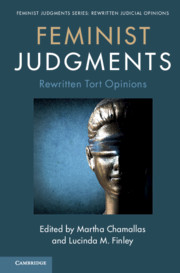Book contents
- feminist judgments: rewritten tort opinions
- Feminist Judgments Series Editors
- Feminist Judgments: Rewritten Tort Opinions
- Copyright page
- Contents
- Notes on Contributors
- Preface
- Table of Cases
- Part I Introduction
- 1 Introduction to Feminist Judgments: Rewritten Tort Opinions
- Part II The Classics
- Part III Intentional Torts
- Part IV Negligence and Vicarious Liability
- Part V Damages
- Index
1 - Introduction to Feminist Judgments: Rewritten Tort Opinions
from Part I - Introduction
Published online by Cambridge University Press: 28 November 2020
- feminist judgments: rewritten tort opinions
- Feminist Judgments Series Editors
- Feminist Judgments: Rewritten Tort Opinions
- Copyright page
- Contents
- Notes on Contributors
- Preface
- Table of Cases
- Part I Introduction
- 1 Introduction to Feminist Judgments: Rewritten Tort Opinions
- Part II The Classics
- Part III Intentional Torts
- Part IV Negligence and Vicarious Liability
- Part V Damages
- Index
Summary
The Introduction to Feminist Judgments: Rewritten Tort Opinions situates the sixteen rewritten feminist opinions and accompanying commentaries contained in the volume into the broader legal and scholarly landscape. Although the idea of a feminist tort law is still difficult for many to imagine, the Introduction details the rich history of feminist and critical torts scholarship. Many of its recurring themes echo those found in critical scholarship more generally, including taking a gender-aware approach, preferring contextual analyses that tap into women’s lived experiences, and being skeptical of abstract dichotomies that mask implicit hierarchies. The volume contains “classic” cases that appear in virtually every torts casebook as well as lesser-known cases that deserve more attention. A large number of the cases in the volume deal with gender-related injuries caused by sexual violence, abuse, harassment, and invasions of privacy. The portrait that emerges is that of a tort system that undercompensates for sexual and reproductive injury. When courts confront such gender-related injuries, they tend not to apply ordinary doctrinal rules or not to apply ordinary rules with the same force as in other settings. The Introduction lists promising strategies to correct for such bias and make tort law more inclusive and egalitarian.
Keywords
- Type
- Chapter
- Information
- Feminist Judgments: Rewritten Tort Opinions , pp. 3 - 24Publisher: Cambridge University PressPrint publication year: 2020



